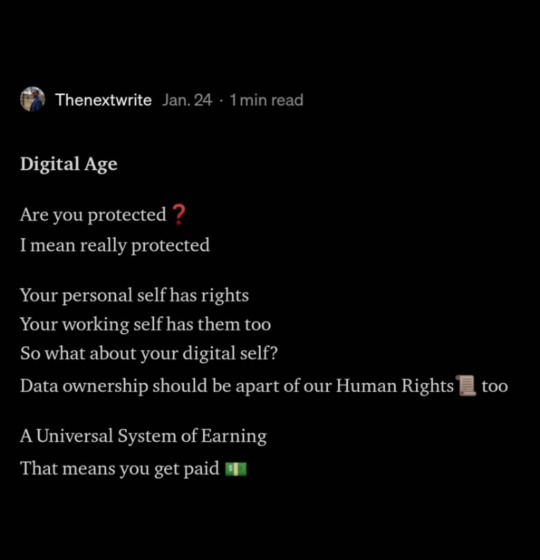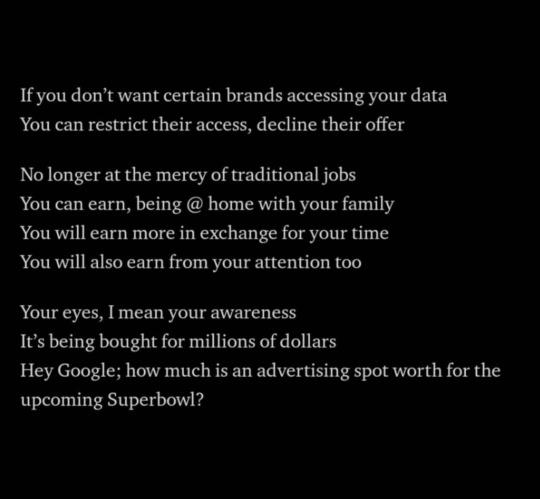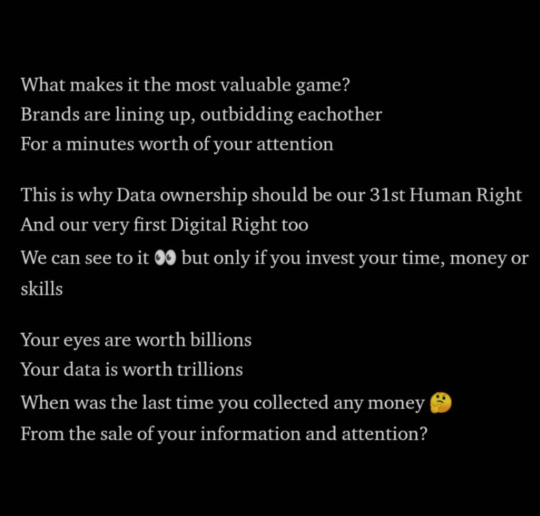#dataownership
Text
⚡️ Embracing User Empowerment: The Web 4.0 Revolution with BlockCertsAI ✊
In the digital age, the control of personal data has been a contentious issue, with major tech giants like Microsoft, Google, and Apple dominating the landscape. However, BlockCertsAI is pioneering a transformative approach with 🌐 Web 4.0, where user privacy and empowerment are at the forefront.
Web 4.0, powered by BlockCertsAI, merges the robustness of blockchain technology with the sophistication of artificial intelligence to offer a new paradigm in business models. This innovative platform ensures that users retain absolute control over their data, unlike the current tech ecosystem where user tools and cloud services are tightly held by centralized entities.
BlockCertsAI has crafted a super-app 🚀 that integrates functionalities akin to Zoom, Microsoft, and Salesforce, all accessible via a single, secure login without the need for passwords. Simply scan a QR code, and you're granted uninterrupted access to a suite of essential business tools. This user-centric design eliminates monthly fees, reflecting BlockCertsAI's commitment to building a web environment from the ground up, by and for real users.
The previous iterations of the web, namely Web 2.0 and Web 3.0, were not architected with privacy 🔐 as a core principle. They were designed for consolidation, storing, and tracking user data. In contrast, BlockCertsAI's approach is mindful of the need for user control and data privacy, especially in an era where AI leverages vast amounts of data.
By owning BCERT Tokens, individuals not only 🛡️ secure their information but also claim their stake in this next-generation Web 4.0. It's a bold step towards a future where users, not corporations, hold the keys to their digital kingdom. Join the revolution and take control of your digital footprint with BlockCertsAI.
#WEB4REVOLUTION#Userempowerment#BlockCertsAI#blockchain technology#artificial intelligence#digital privacy#user control#dataownership#BCERTTokens#Decentralizedweb#SuperApp#Nomorepasswords#Businesstools#Privacyfirst#IAandData#Ownyourdata#Digitalfootprint#techinnovation#futureofweb#jointherevolution#blockcertsecosystem
5 notes
·
View notes
Text
The rise of AI and IoT has sparked a global demand for data ownership and control. Citizens now insist on robust data privacy practices, pushing brands to prioritize transparency and security. Explore seven best practices to empower citizen data rights.
0 notes
Text
youtube
Watch the American Climate Leadership Awards 2024 now: https://youtu.be/bWiW4Rp8vF0?feature=shared
The American Climate Leadership Awards 2024 broadcast recording is now available on ecoAmerica's YouTube channel for viewers to be inspired by active climate leaders. Watch to find out which finalist received the $50,000 grand prize! Hosted by Vanessa Hauc and featuring Bill McKibben and Katharine Hayhoe!
#ACLA24#ACLA24Leaders#youtube#youtube video#climate leaders#climate solutions#climate action#climate and environment#climate#climate change#climate and health#climate blog#climate justice#climate news#weather and climate#environmental news#environment#environmental awareness#environment and health#environmental#environmental issues#environmental justice#environment protection#environmental health#Youtube
17K notes
·
View notes
Video
youtube
Who will own what - from personal data to digital brands?
#youtube#PersonalDataRights#DataOwnership#DigitalIdentity#OnlinePrivacym#BrandOwnership#DigitalBrands#WhoOwnsWhatOnline#DataPortability#DataProtection#InformationProperty
0 notes
Text

⌚ Your Health on Your Wrist:
Smartwatches Keep Tabs on Our Daily Lives by Obtaining and Analysing Our Personal Data. (Garcia, M., 2020)
0 notes
Text
Web3: Transforming the Digital Landscape with Blockchain
Web3 represents a visionary concept for the internet, one underpinned by the revolutionary power of blockchain technology. Often dubbed the "decentralized web," Web3 is poised to redefine our online experiences and empower users with greater control over their data.
While Web3 remains in its nascent stages, its potential implications for the internet are profound:
1. Decentralization: Web3 seeks to depart from the centralized structure of today's internet, where a select few corporations wield immense control over data and online traffic. Instead, it envisions a landscape fueled by a network of decentralized nodes, empowering users to dictate the fate of their data and digital interactions.
2. Data Ownership: In the Web3 paradigm, users become the rightful owners of their data, liberating it from the clutches of tech giants like Google and Facebook. This shift offers individuals more autonomy over how their data is utilized and monetized.
3. New Frontiers: Web3 holds the promise of unlocking uncharted territories on the internet. It paves the way for innovative applications and services that are presently unfeasible within the confines of the current internet architecture. This includes decentralized social media platforms, peer-to-peer marketplaces, and autonomous financial ecosystems.
Specific Impacts of Web3:
- Social Media: Web3 could usher in decentralized social media platforms, free from the monopolistic control of a single entity. Users would gain unprecedented authority over their content and experiences, reducing the risk of content censorship.
- E-commerce: With Web3, decentralized marketplaces could flourish, facilitating direct transactions between buyers and sellers without intermediaries. This democratizes online commerce, lowering fees and enhancing accessibility.
- Finance: Web3's potential extends to the creation of decentralized financial systems, including exchanges and lending platforms. This grants individuals greater control over their finances and simplifies access to financial services.
While Web3 promises a more decentralized, secure, and equitable internet, it remains essential to acknowledge that it is in the early stages of development. Numerous challenges must be addressed before widespread adoption can become a reality.
#Web3#Blockchain#Decentralization#DataOwnership#Cryptocurrency#DigitalRevolution#DecentralizedWeb#InternetInnovation#Web3Applications#Ethereum#SmartContracts#DigitalPrivacy#InternetTrends#TechInnovation#DigitalSecurity#OnlinePrivacy#Web3Economy#DigitalTransformation#Cryptoeconomics#FutureoftheInternet
0 notes
Text
Understanding Web 3.0: A Shift Towards Decentralization and User Sovereignty
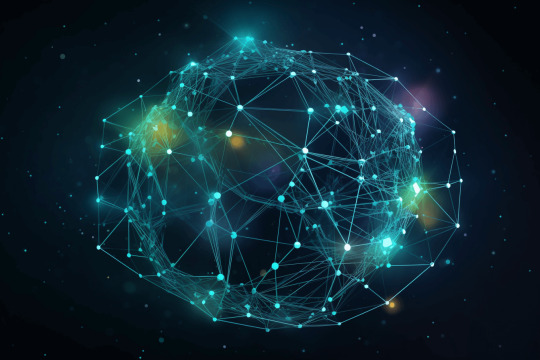
The digital world is on the brink of a paradigm shift as we transition from Web 2.0 to Web 3.0, also known as Web3. This shift promises a more decentralized, transparent, and user-centric version of the internet, profoundly changing our online interactions.
Decentralization: Power to the People
A pivotal feature of Web3 is decentralization, a direct contrast to the current Web 2.0 landscape dominated by tech behemoths such as Google and Facebook. Web3 envisions an internet where users, rather than centralized entities, have control. Enabled by blockchain technology, this model distributes power among the users, allowing them to own their digital footprints.
Blockchain Technology and Cryptocurrencies: The Backbone of Web3
Web3 fundamentally relies on blockchain technology, a type of distributed ledger that maintains records across multiple systems. With its transparent and immutable nature, blockchain facilitates decentralized applications (dApps), pushing the boundaries of traditional online services. Cryptocurrencies like Bitcoin and Ethereum, built on this technology, play a significant role in transactions within the Web3 ecosystem.
Smart Contracts: Code as Law
Web3 incorporates smart contracts, code-based agreements that autonomously execute transactions when specific conditions are fulfilled. They remove the need for intermediaries, fostering transparency and efficiency. Smart contracts bring a new level of automation and trust to online transactions, from simple transfers to complex contractual agreements.
Interoperability: The Seamless Web
Web3 emphasizes interoperability, fostering a digital environment where data and assets can freely move across platforms, applications, and blockchains. This seamless interaction is expected to promote innovation, user convenience, and an overall improved digital experience.
Privacy and Data Ownership: Taking Back Control
A core proposition of Web3 is to give users control over their data. Unlike Web 2.0, where tech companies own and monetize user data, Web3’s decentralized architecture seeks to return data ownership to the users. This move signifies a monumental shift in privacy and data rights, fostering an online ecosystem that respects user privacy.
Decentralized Finance (DeFi): Revolutionizing Finance
A prominent subsector of Web3, Decentralized Finance (DeFi), aims to recreate and improve traditional financial systems in a decentralized environment. From loans to insurance to trading, DeFi platforms offer financial services on the blockchain, democratizing access to financial systems and services.
Non-Fungible Tokens (NFTs): The Dawn of Digital Ownership
NFTs, or Non-Fungible Tokens, are unique digital assets residing on a blockchain. They have gained significant attention for their role in digitizing arts, music, and other forms of creative work, representing a new way of asserting ownership and provenance in the digital realm.
The Web3 Technology Stack: Building the Future Web
Technologies such as the InterPlanetary File System (IPFS), a peer-to-peer network for storing and sharing data, and the Ethereum blockchain, a platform for creating dApps, are part of the foundational tech stack for Web3. These technologies underpin the new wave of decentralized applications and platforms shaping the Web3 landscape.
DAOs (Decentralized Autonomous Organizations): The Future of Organizations
Decentralized Autonomous Organizations (DAOs) are one of the new entities birthed in the Web3 space. DAOs are fully automated and decentralized, running on smart contracts on a blockchain. The decision-making mechanisms of DAOs are governed by programming, thereby eliminating the need for a central authority. DAOs represent a radical shift in the conception of organizational structures, fostering an era of automation and decentralization.
Identity and Reputation Systems: Trust in a Decentralized World
In the realm of Web3, identity and reputation systems are anticipated to play a crucial role. The notion of self-sovereign identity empowers users with absolute control over their personal data, while decentralized reputation systems help to establish trust within the network. These systems will be vital in securing user trust and fostering cooperative behavior in the network.
User Interface and Experience: Bridging the Complexity Gap
The interface and user experience in Web3 are expected to be fundamentally different from Web2.0 due to the technical complexities of blockchain and cryptocurrencies. The challenge for Web3 developers is designing user-friendly interfaces that effectively veil these complexities, ensuring a seamless user experience.
Token Economy and Incentives: Reciprocity in Web3
Web3 is likely to heavily depend on tokens as a basis for its economy. These digital assets are used to incentivize and reward users for their contributions to the network, fostering a more reciprocal relationship between platforms and their users.
Internet of Things (IoT) and AI Integration: Automation and Intelligence in Web3
The integration of IoT and AI technologies in the Web3 framework unlocks novel possibilities for smart and automated applications. These integrations can revolutionize various sectors, ranging from supply chain management to home automation, driving efficiency and productivity.
Role of ISPs: Redefining Internet Access
In the current internet infrastructure, Internet Service Providers (ISPs) play a pivotal role in managing and controlling access to the web. However, with the advent of Web3's decentralization, the role of ISPs may undergo significant changes, potentially diminishing their importance.
Security: Safeguarding the Decentralized Web
Despite the inherent security of blockchain technology, the applications built on it may have vulnerabilities. For instance, smart contracts can present exploitable weaknesses for hackers. As the Web3 ecosystem expands, the need for robust cybersecurity measures also grows in importance.
Digital Divide: The Inclusivity Challenge
There's concern that the transition to Web3 could worsen the existing digital divide if access to Web3 necessitates certain technical expertise or financial resources that not everyone possesses. Therefore, ensuring that Web3 is inclusive and accessible to all is a pressing challenge that needs concerted efforts to overcome.
With these new integrations, Web3 is set to disrupt the digital world in unimaginable ways. It's a complex and exciting new frontier that promises to revolutionize how we interact with the internet and each other. While there are numerous challenges to address, the potential for a more equitable and user-centered internet makes this journey worthwhile.
Challenges Ahead: Scalability, Energy, Regulations, and Adoption
Despite its promise, Web3 faces significant challenges. Scalability issues, energy efficiency concerns, regulatory uncertainties, and user adoption hurdles are considerable roadblocks. As a rapidly evolving field, Web3 requires ongoing development, refinement, and robust dialogue among stakeholders to address these challenges.
The transition from Web 2.0 to Web3 signifies an important evolution in the digital world. It embodies a move towards a more user-centric, decentralized, and transparent internet. While the road ahead may be fraught with challenges, the potential rewards of a more equitable, open, and user-controlled web are immense.
Read the full article
#blockchaintechnology#Cryptocurrencies#DataOwnership#Decentralization#DecentralizedFinance#interoperability#Non-FungibleTokens#privacy#smartcontracts#Web3.0
0 notes
Text
youtube
Watch the 2024 American Climate Leadership Awards for High School Students now: https://youtu.be/5C-bb9PoRLc
The recording is now available on ecoAmerica's YouTube channel for viewers to be inspired by student climate leaders! Join Aishah-Nyeta Brown & Jerome Foster II and be inspired by student climate leaders as we recognize the High School Student finalists. Watch now to find out which student received the $25,000 grand prize and top recognition!
#ACLA24#ACLA24HighSchoolStudents#youtube#youtube video#climate leaders#climate solutions#climate action#climate and environment#climate#climate change#climate and health#climate blog#climate justice#climate news#weather and climate#environmental news#environment#environmental awareness#environment and health#environmental#environmental issues#environmental education#environmental justice#environmental protection#environmental health#high school students#high school#youth#youth of america#school
17K notes
·
View notes
Text
Czy TikTok szpieguje
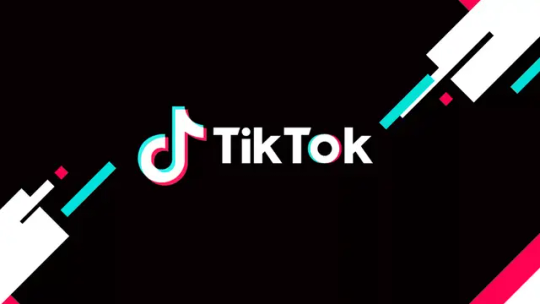
Istnieją obawy dotyczące prywatności i bezpieczeństwa danych na TikToku, które pojawiły się w przeszłości. Jednak nie ma jednoznacznych dowodów na to, że TikTok bezpośrednio szpieguje użytkowników.
Read the full article
#CzyTikTokszpieguje#databreaches#datacollection#dataconfidentiality#dataencryption#datagovernance#datamining#dataownership#dataprivacy#dataprivacylaws#dataprivacyrights#dataprotection#dataprotectionpractices#dataprotectionregulations#datasecurity#datasecuritymeasures#datasharing#datastorage#datatracking#datatrackingpolicies#datatrackingpractices#datatransparency#datausage#digitalprivacy#digitalsurveillance#informationsecurity#onlinedata#onlinedataprivacy#onlinemonitoring#onlineprivacy
0 notes
Text
The Rise of Web3 and Its Impact on High-Storage Applications

Web3, the third generation of the internet, is a revolutionary concept that brings decentralization to the forefront. Powered by blockchain technology and other decentralized technologies, Web3 aims to redefine how we interact with digital services, shifting from traditional centralized models to decentralized peer-to-peer networks. This article explores the potential of Web3 in revolutionizing high-storage applications, enabling greater user control, privacy, and data ownership.
1. Decentralization: Empowering Users and Enhancing Data Integrity
At its core, Web3 is built on blockchain technology, leveraging its distributed ledger to maintain a cryptographically-secured and continuously growing list of records called blocks. This decentralized nature enables direct peer-to-peer interactions, ensuring that no single entity has complete control or ownership over data. Unlike traditional centralized systems, Web3 safeguards data from censorship, manipulation, and single-point-of-failure risks, enhancing data integrity and availability.
2. Interoperability: Connecting Blockchain Networks for Enhanced Accessibility
Web3 introduces interoperability as a significant aspect, allowing different blockchain networks to connect seamlessly. Interoperability protocols, such as cross-chain bridges, enable users to transfer assets from one blockchain to another. Leveraging interoperability, high-storage applications can be developed to make them accessible on multiple blockchain networks, expanding their reach and usability.
3. Distributed File Systems: Secure and Scalable Storage Solutions
Web3 incorporates distributed file systems like the InterPlanetary File System (IPFS) and Swarm, which provide secure and scalable storage solutions for high-storage applications. These file systems break down files into smaller chunks, distribute them across multiple nodes, and utilize content-based addressing. By ensuring data redundancy and efficient retrieval, distributed file systems enhance the reliability and performance of storage systems, making them ideal for high-storage applications.
4. Smart Contracts and Tokenization: Enforcing Rules and Incentivizing Participation
Web3 enables the use of smart contracts, self-executing contracts with predefined rules and conditions encoded within the blockchain. Smart contracts facilitate trustless and automated interactions, allowing high-storage applications to enforce rules, handle transactions, and manage access control for data storage and retrieval. Moreover, Web3 introduces tokenization, where digital assets or tokens represent ownership or access rights. Tokenization incentivizes participants to contribute their storage resources, creating a cost-effective and scalable decentralized network.
5. Overcoming Challenges: Scalability, Storage Optimization, and Data Availability
While blockchain technology holds immense potential for high-storage applications, it faces scalability challenges when handling large amounts of data. To support such applications, blockchain networks need to enhance their scalability through solutions like sharding, layer-2 protocols, or sidechains, enabling parallel processing and increased capacity.
Efficient utilization of storage resources is another crucial factor. Blockchain networks must optimize data storage by employing techniques such as data compression, deduplication, and data partitioning to minimize storage requirements while maintaining data integrity and availability.
Ensuring data availability is essential for high-storage applications. Blockchain networks need to incentivize storage nodes to maintain high availability and integrate distributed file systems like IPFS or Swarm to replicate data across multiple nodes, enhancing data availability and reliability.
6. Privacy and Security: Safeguarding Sensitive Data
High-storage applications often deal with sensitive data, making data privacy and security paramount. Blockchain networks must incorporate robust encryption techniques and access control mechanisms to protect stored data. Privacy-focused technologies like zero-knowledge proofs or secure multiparty computation can be integrated to enable secure and private data storage and retrieval.
7. Governance, Consensus, and User Experience
Efficient governance and consensus mechanisms are crucial for blockchain networks handling large volumes of data. Transparent and decentralized governance models, such as on-chain or decentralized autonomous organizations (DAOs), can facilitate collective decisions regarding storage-related policies and upgrades.
Adopting efficient consensus algorithms like proof-of-stake (PoS) or delegated proof-of-stake (DPoS) can ensure faster and more energy-efficient consensus for data storage transactions. Improving the user experience is also vital, as blockchain technology in high-storage applications should provide a user-friendly interface and seamless integration with existing applications. Tools, libraries, and frameworks simplifying the development and deployment of high-storage blockchain applications should be readily available.
8. Regulatory Compliance: Meeting Specific Requirements
High-storage applications may need to adhere to specific regulatory requirements, such as data protection regulations or industry-specific compliance standards. Blockchain networks must provide features and mechanisms that allow compliance with such regulations. Built-in privacy controls, auditability features, or integration with identity management systems can ensure regulatory compliance while utilizing blockchain-based storage.
Conclusion
Web3 has the potential to revolutionize high-storage applications, offering a decentralized and secure infrastructure that empowers users and ensures data integrity. By harnessing the capabilities of decentralization, interoperability, distributed file systems, smart contracts, and tokenization, Web3 provides a scalable, incentivized, and resilient environment for storing and retrieving large volumes of data. Overcoming challenges related to scalability, storage optimization, data availability, privacy, security, governance, consensus, and user experience will pave the way for blockchain technology to unleash its full potential in high-storage applications. Embrace the era of Web3 and unlock the future of data storage and ownership.
For more articles visit: Cryptotechnews24
Source: cointelegraph.com
Latest Posts
Read the full article
#blockchainnetworks#blockchaintechnology#CryptoNews#dataavailability#dataintegrity#dataownership#dataredundancy#decentralizedpeer-to-peernetworks#decentralizedweb#distributedfilesystems#high-storageapplications#InterPlanetaryFileSystem(IPFS)#layer-2protocols#privacy#scalabilitychallenges#sidechains#smartcontracts#storageoptimization#Swarm#tokenization#Web3
0 notes
Text

There are several advantages that a branded app can offer over social media when it comes to connecting with your customers. Here are some of the key advantages:
Direct connection with customers: Unlike social media platforms where your content can get lost in the noise, a branded app offers a direct connection with your customers. Once they download your app, they have a direct channel to engage with your brand and access your content.
Personalised experience: A branded app allows you to provide a personalised experience to your customers. You can customise the content and features based on the user's preferences and behavior, which can lead to higher engagement and retention.
Improved customer loyalty: Branded apps can help you build customer loyalty by providing a seamless and convenient experience. Customers are more likely to return to your app if they have a positive experience, which can lead to higher customer lifetime value.
Data ownership: With a branded app, you have ownership of the data collected from your customers. This can help you better understand your customers and personalise your marketing efforts.
Better control over branding: Social media platforms can limit your ability to fully control your brand. With a branded app, you have complete control over the design, messaging, and overall branding of the app.
Overall, a branded app can offer several advantages over social media when it comes to connecting with your customers. By providing a personalised and convenient experience, you can build customer loyalty and strengthen your brand.
If you're interested in creating a branded app for your business, it's important to work with a reputable app development company that can help you build a high-quality app that meets your needs. Don't hesitate to take your business to the next level by creating your own branded app today!
#BrandedApp#MobileApps#CustomerEngagement#PersonalizedExperience#DirectCommunication#CustomerLoyalty#DataOwnership#BrandControl#MarketingStrategy#AppDevelopment#BusinessGrowth
0 notes
Text
The explosion of AI and IoT technologies is fuelling a movement demanding greater control over personal data. People are increasingly uneasy about how their data is used and protected.
This isn't just a passing concern. Here's why it matters:
Millennials are leading the charge: They're walking away from companies with weak data privacy practices.
Strict regulations are emerging: GDPR, CCPA, DPDP, and PIPL empower individuals with data rights.
Unstructured data poses challenges: It hinders compliance, security, and trust.
But there's hope!
By embracing intelligent and unified data management, businesses can:
Regain trust: Prioritize compliance, security, and transparency.
Mitigate risks: Address data breaches and ethical concerns.
Uphold ethical standards: Become responsible data stewards.
In this blog, we explore:
The Citizen Data Uprising and its driving factors.
How unstructured data hinders data ownership.
Intelligent and unified data management as the solution.
Transparency as the cornerstone of trust in the Data Democracy era.
Read the blog to learn more - https://cutt.ly/rerQHd8F
#dataownership #dataprivacy #datamanagement #AI #IoT #GDPR #CCPA #DPDP #PIPL
0 notes
Text
🔬📚 UNESCO explores intellectual property in the age of generative AI, raising concerns about data ownership. Stay informed on this evolving intersection of technology and creativity. #AI #IntellectualProperty #DataOwnership
https://iipla.org/ip-news/unesco-explores-intellectual-property-in-the-age-of-generative-ai-raises-data-ownership-concerns/
0 notes
Text
At ValeVPN, we take your privacy and security seriously 🧐
We don't collect any users' information except for your email address. We strongly believe that zero-logs policy is critical for VPN users. Here's why:
➡️ Zero-logs policy means that we do not store any information about your online activities. This information includes your browsing history, downloads, and IP address.
➡️ By not collecting any user data, we prevent any third-party from accessing your private information. This includes government agencies, advertisers, and cybercriminals.
➡️ With a zero-logs policy, we ensure that your online activities remain private and anonymous. This is particularly important for those who want to bypass internet censorship and surveillance in their countries.
➡️ Our zero-logs policy assures you that we are committed to safeguarding your privacy and ensuring that you have complete control over your online activities.
When it comes to online privacy and security, a zero-logs policy is essential. At ValeVPN, we take our user's privacy seriously, and that's why we don't steal or sell your data. Trust us to keep your online activities private and secure. 🔐
🔗 https://www.valevpn.com/
ZeroLogPolicy #DataPrivacy #DataSecurity #DataProtection #NoDataCollection #NoDataMining #DataRights #DataSovereignty #DataControl #DataOwnership #DataFreedom
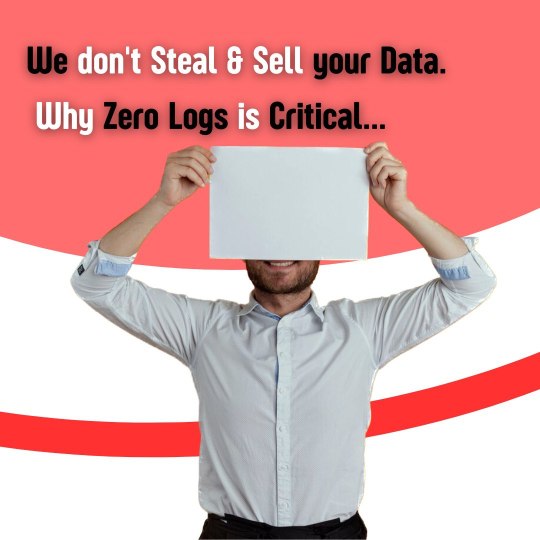
1 note
·
View note
Text
Unlock the future of data democratization with these five innovative ideas! Empower individuals with data ownership, control, and security. Data is the new currency.
0 notes
Text
Introducing Data Mesh
Check out my latest video on #DataMesh - an emerging approach to data architecture that is revolutionizing data ownership and management. #DataArchitecture #DecentralizedData #DataOwnership
Please do not forget to subscribe to our posts at www.AToZOfSoftwareeEgineering.blog.
Listen & follow our podcasts available on Spotify and other popular platforms.
Have a great reading and listening experience!

View On WordPress
#collaboration#data architecture#data governance#data integration#data management#data mesh#data ownership#data product#data quality#decentralized data#domain-driven design#self-serve infrastructure#youtube#security#it leadership#best practices#software development#automation#it leaders#innovation#business intelligence#agile development
1 note
·
View note
Text
Tweeted
Participants needed for online survey! Topic: "Data ownership and surveillance capitalism" https://t.co/fi15cm2WNf via @SurveyCircle #DataPrivacy #DataOwnership #surveillance #capitalism #BehaviouralModification #survey #surveycircle https://t.co/tkDBFFAIlH
— Daily Research @SurveyCircle (@daily_research) Aug 16, 2022
0 notes
